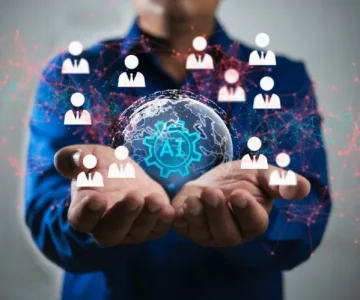Artificial Intelligence (AI) has moved from being a futuristic concept to a reality that’s shaping the world in profound ways. It is not just a trend; AI is transforming industries, revolutionizing workflows, and influencing decision-making across the globe. As AI continues to evolve, its impact on various sectors is becoming increasingly evident. In this post, we’ll explore how AI is impacting industries worldwide, from finance to healthcare, and what opportunities and challenges come with its adoption.
How AI is Transforming Industries
AI is making a significant impact across multiple industries by improving efficiency, enhancing decision-making, and providing innovative solutions. Let’s take a closer look at how AI is affecting some key sectors:
1. Finance
AI is reshaping the finance industry, particularly with the advent of algorithmic trading. AI algorithms can process data at incredible speeds, allowing for lightning-fast trade executions that influence market trends. Additionally, AI is being used to identify and prevent fraudulent transactions, enhancing security in financial systems. However, AI’s growing influence in finance also brings risks, such as the potential for algorithmic biases and manipulation, necessitating robust regulatory frameworks.
2. Retail
In retail, AI is enhancing the shopping experience by personalizing product recommendations based on customer data. This helps businesses increase sales and build stronger customer loyalty. AI-powered chatbots are also improving customer service by automating routine inquiries, making interactions faster and more efficient. While AI offers numerous benefits in retail, challenges such as data privacy concerns and job displacement still need to be addressed.
3. Transportation
The transportation sector is witnessing a transformation thanks to AI, particularly with the development of self-driving cars. These vehicles have the potential to reduce accidents, improve traffic flow, and lower transportation costs. AI also optimizes route planning for logistics and supply chain management. However, concerns regarding safety, ethics, and liability must be thoroughly addressed before AI-powered vehicles become mainstream.
4. Agriculture
AI is revolutionizing agriculture by optimizing resource usage and increasing crop yields through precision farming. AI systems analyze soil and weather data to make smarter decisions about irrigation and crop management. Additionally, AI-powered tools are helping detect pests and diseases early, ensuring better food security. Despite these advancements, there are concerns about equitable access to AI technologies, and the potential for corporate monopolies over agricultural resources needs attention.
Which Industry is Most Affected by AI?
While AI impacts various industries, some sectors are more directly influenced by its advancements than others. Here’s a look at industries where AI is having the most significant effect:
1. IT Industry
AI is transforming the IT industry by automating routine tasks such as network management, cybersecurity threat detection, and IT support. AI-driven development tools are improving software quality and accelerating development processes. However, these innovations raise concerns about job displacement and the need for IT professionals to upskill in order to stay relevant in an AI-driven job market.
2. Manufacturing
In manufacturing, AI-driven automation is changing the way production lines operate. Robots are performing tasks that once required human workers, increasing efficiency and product quality. However, this shift to automation requires workers to learn new skills and adapt to the changing landscape of manufacturing.
3. Healthcare
AI’s impact on healthcare is profound, with AI algorithms improving diagnostics, personalizing treatment plans, and accelerating drug discovery. However, there are ethical and privacy concerns, especially regarding the handling of sensitive patient data. The healthcare sector needs to address these concerns while integrating AI to improve patient outcomes.
The Global Impact of AI
The reach of AI goes beyond individual industries, influencing the global landscape in multiple ways. Here are a few key areas where AI’s impact is being felt:
1. Social Inequality
One of the major concerns surrounding AI is the potential for exacerbating social inequalities. In many developing nations, access to AI technologies and the skills needed to use them are limited. Bridging this digital divide is essential to ensure that everyone can benefit from AI advancements, which is why investing in education and AI-focused reskilling programs is crucial.
2. Economic Growth
AI has the potential to drive significant economic growth by boosting productivity and fostering innovation. However, job displacement due to automation is a real concern. It’s essential for governments and businesses to proactively address these challenges through workforce reskilling initiatives to ensure that AI contributes to inclusive economic growth.
3. Global Competition
Nations like the US, China, and the European Union are leading the way in AI development, positioning themselves at the forefront of global economic competition. To ensure that AI benefits all nations, it’s vital to foster international collaboration and knowledge sharing. This will prevent the widening gap between developed and developing countries and ensure that AI-driven growth is equitable.
4. Ethical Considerations
As AI continues to evolve, ethical considerations become increasingly important. AI systems can perpetuate bias if not carefully designed and deployed. Issues related to algorithmic transparency, data privacy, and accountability need to be addressed on a global scale through robust regulations and ethical guidelines.
5. Environmental Impact
While AI can contribute to sustainability efforts, such as optimizing energy use in smart grids or improving agricultural practices, its environmental impact cannot be ignored. The energy consumption of AI models and the environmental cost of maintaining hardware infrastructure must be carefully managed to ensure that AI development is environmentally sustainable.
Moving Forward: Shaping a Responsible AI Future
As AI continues to revolutionize industries, it’s essential to approach its development and deployment with responsibility and foresight. Here are a few steps that can help shape a better future for AI:
1. Invest in Research and Development
Ongoing research is crucial to address the ethical concerns surrounding AI and to develop applications that benefit society. Collaboration between governments, industries, and academia can accelerate the development of AI technologies that are both innovative and responsible.
2. Focus on Education and Workforce Development
To prepare the workforce for the AI-driven future, it’s essential to invest in education and training programs that equip individuals with the skills needed to thrive in this changing landscape. Lifelong learning and adaptability will be key to ensuring that workers are prepared for the jobs of the future.
3. Implement Responsible Governance
AI development must be guided by clear and ethical regulations. Governments and international organizations must collaborate to create a framework for responsible AI deployment that ensures safety, privacy, and fairness for all users.
4. Empower Civil Society
Public engagement in AI development is crucial for building trust and ensuring that AI benefits everyone. Transparent communication, open dialogue, and public participation in AI policy-making will help ensure that AI serves the common good.
Conclusion: Harnessing the Power of AI for a Better Future
AI is undeniably transforming industries, economies, and societies at an unprecedented pace. While the benefits of AI are vast, it’s essential to address the challenges associated with its integration into different sectors. By fostering ethical AI development, ensuring inclusive growth, and preparing the workforce for the future, we can harness AI’s full potential to create a more equitable, sustainable, and prosperous world.





